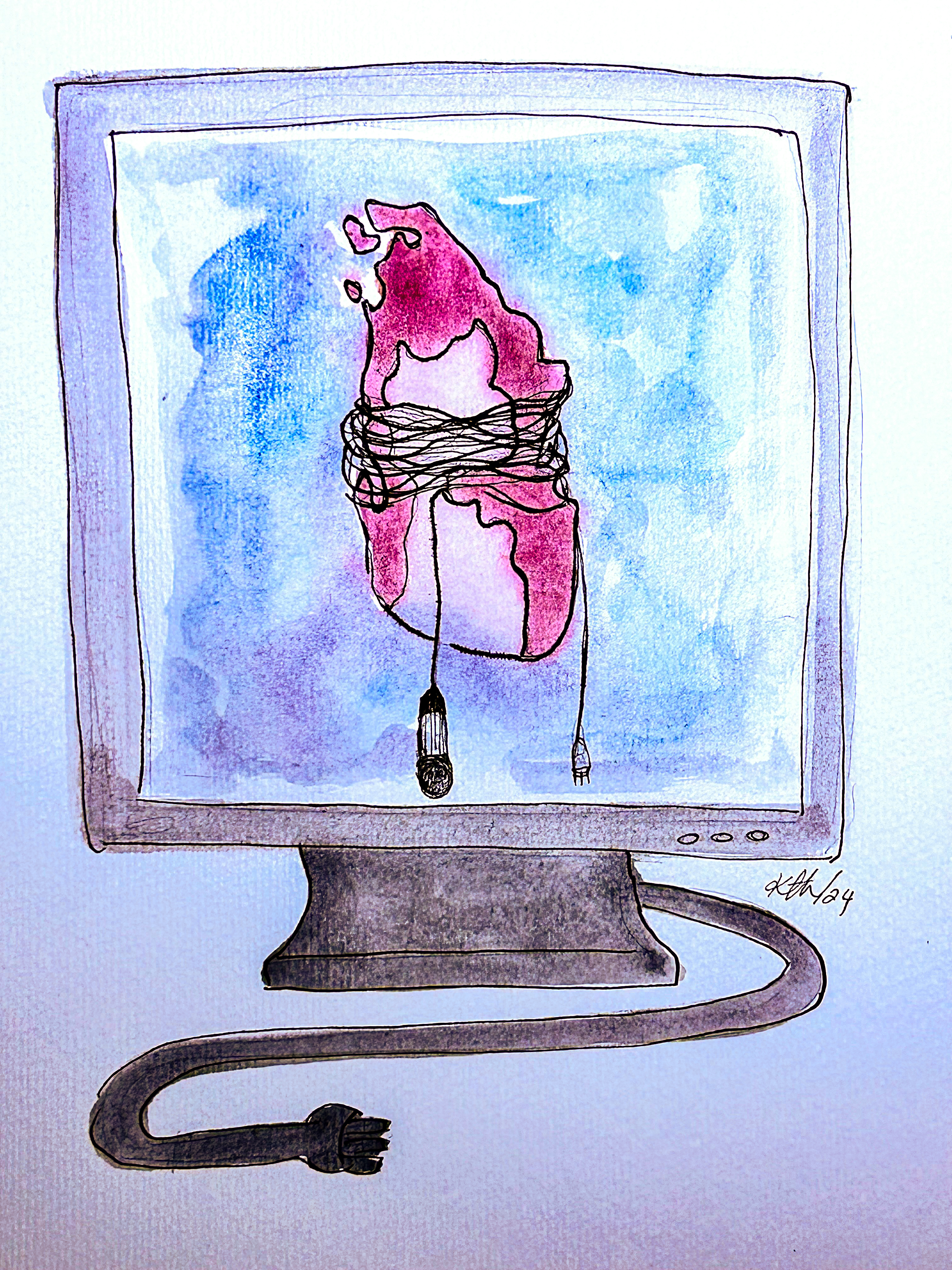Illustration by Keera Ratnam / @wavesofcolour
There has been much consternation in recent weeks as the Sri Lankan government passed the Online Safety Bill, a new piece of legislation that essentially allows the state to police and prosecute what individuals and organisations post online. There have been remarks from the United Nations human rights office, diplomats from various Western countries and a host of NGOs – all of whom have expressed concern over the risks to freedom of expression on the island. In the Tamil North-East, however, those concerns have long been a reality. Left unabated and unchallenged by the international community for years, that climate of repression has solidified and is now being rolled out across the island.
There is no denying how draconian this new law is. It covers a broad range of supposed offences online such as promoting “feelings of ill-will and hostility”, yet remains vague on definitions, whilst pledging harsh punishments. Its allocation under the ministry of public security also does not bode well for how it will be enforced, given how the same ministry has arrested tens of thousands under ‘Operation Yukthiya’ in recent months – another state initiative that stands accused of grossly violating human rights. The new bill now means those across the island will have to be very careful about what they post online. The wrong words or images posted, even on their private social media pages, will be subject to government scrutiny and risk a prison sentence.
None of this is new for Eelam Tamils who, under the boot of the Sri Lankan state, continue to live in one of the most miltiarised places in the world. For years, the occupation has also meant Tamils have been detained by the security forces for posts on social media, which the military openly declares it monitors closely. In 2021, a Tamil lawmaker said more than 100 youths had been detained over the previous year for such alleged offences. One Tamil journalist was detained for more than 470 days over a Facebook post, in what Reporters San Frontiers deemed "Kafkaesque" charges. The Tamil Guardian’s online presence too has been under fire from the state. That international concern comes now, and not when Tamils have been targeted, is not lost on us. There has long been a numbed apathy towards the state’s routine oppression of the Tamil homeland. But, having been left unchecked for years, an emboldened Sri Lankan state has now codified what has been in place in the North-East, across the rest of the island. There is little doubt that whilst free speech across the island remains in peril, it is those who are the usual targets of the state that this bill will be deployed against most vociferously.
The fact that the move from Colombo takes place now, whilst it remains in desperate need of international bailouts and goodwill, particularly from the West, underlies how brazenly it feels it can act. Furthermore, it is being led by Ranil Wickremesinghe - a man with close ties to Western governments, who was once hailed as the island’s neoliberal saviour (and a figure that Tamils were chastised for refusing to vote for). Sri Lanka has demonstrated that even in its worst economic crisis in generations, when it is so reliant on international support and capital, it will still refuse to cease its repression and relentless suffocating of civil liberties.
Whilst challenges to the bill continue, there are clear lessons to be drawn from this saga. No amount of assuaging, economic or political, will reform Sri Lanka’s political and institutional establishments. Indeed, all the years of international manoeuvring have done is signal to Colombo that it has a carte blanche. Instead, states that control the purse strings Sri Lanka relies on must get serious with them. Key lifelines such as the International Monetary Fund’s bailout loan and the European Union’s GSP+ trade preferences have safeguards in place to ensure human rights are not jeopardised. They must be utilised and funding tightened until their stringent conditions that ensure fundamental freedoms for all are adhered to.
Though the many statements of concern are undoubtedly welcome, international action speaks much louder than any of these words. Until Sri Lanka is forced into reform, everyone on the island has their freedom of expression endangered and liberty at risk.
We need your support
Sri Lanka is one of the most dangerous places in the world to be a journalist. Tamil journalists are particularly at threat, with at least 41 media workers known to have been killed by the Sri Lankan state or its paramilitaries during and after the armed conflict.
Despite the risks, our team on the ground remain committed to providing detailed and accurate reporting of developments in the Tamil homeland, across the island and around the world, as well as providing expert analysis and insight from the Tamil point of view
We need your support in keeping our journalism going. Support our work today.
For more ways to donate visit https://donate.tamilguardian.com.


